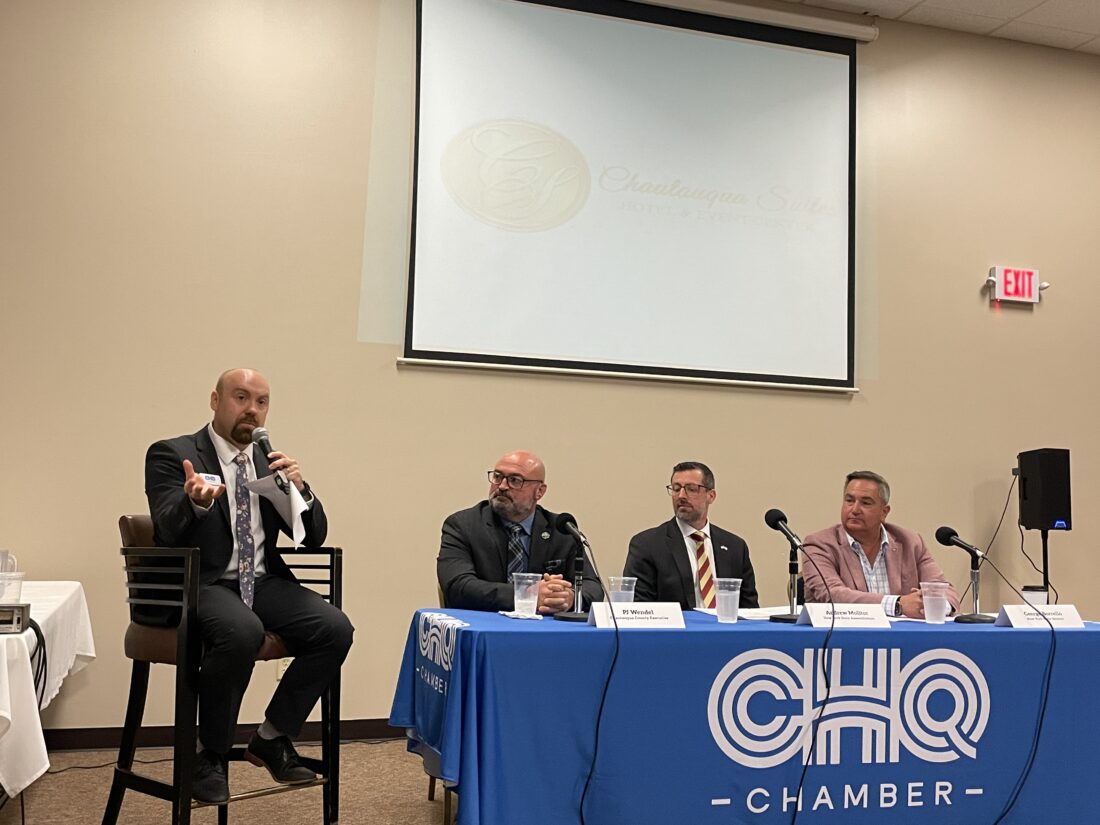Leaders Share Thoughts, Concerns At Luncheon

CHQ Chamber President Daniel Heitzenrater, left, moderates the Chamber’s Elected Officials Panel Luncheon featuring County Executive PJ Wendel, Assemblyman Andrew Molitor and state Sen. George Borrello. Photo by Gregory Bacon
MAYVILLE – Energy, taxes, the weeds in Chautauqua Lake, housing and the state’s business climate were all topics of discussion at the latest CHQ Chamber event.
On Friday, the CHQ Chamber sponsored an Elected Officials Panel Luncheon, including County Executive PJ Wendel, Assemblyman Andrew Molitor, and state Sen. George Borrello.
All three elected officials are Republicans and expressed support for one another as they debated topics about challenges and successes in Chautauqua County.
Wendel highlighted how in Chautauqua County there has been $1.6 billion worth of economic development during his six-year tenure as county executive.
He noted how while the county is one of the poorer counties in the state, it is also one of the most affordable. “This is a great place to raise a family; this is a great place to have a home,” Wendel said.
Borrello, who lives on the shores of Lake Erie in Sunset Bay, noted how in most places, he would not be able to afford a home on the water. “We live in a beautiful, unique place. … What we have here is worth protecting and fighting for,” he said.
Molitor, who has only been in office for eight months, says he sees a lot of problems in Albany. Still, he is encouraged. “I do think there’s a lot of hope for our state, and ultimately our county,” he said.
ENERGY
Wendel shared how he is still very excited about the possibility of turning the former NRG plant in Dunkirk into a micro-nuclear energy facility but notes it will take some time.
He continues to believe that NRG should use natural gas in the short-term, as it will take more than a decade to get a nuclear plant up and running in the north county city.
Molitor stated how wind and solar only create about 6% of energy needed in the state, and agrees that natural gas would be a good option for the former NRG plant.
Borrello believes that the reason Gov. Kathy Hochul is looking at nuclear energy now is because some agencies predict there will be rolling blackouts in the state as soon as next year due to the shortage of energy.
TAXES
Wendel shared how five of the six years the county legislature has been able to lower the property tax rate. He did note that the levy has gone up, but said the levy has not gone up nearly as much as inflation.
Borrello said the state has made everything more expensive with the increase of minimum wage, paid days off, workers compensation and more.
Molitor agreed and said the state needs to be more business friendly.
HOUSING
Borrello expressed concerns that too much new housing that is being created is being called “workforce housing” but will eventually become “low income housing” because of how long it takes to be constructed.
Molitor expressed concern about how natural gas will not be used for new housing starting next year, which will increase the cost to build new homes. “There aren’t enough cheap, affordable houses going on the market and New York has created this problem,” he said.
CHAUTAUQUA LAKE
Wendel said the Jefferson Project, which has been headed up by Chautauqua Institution, should have its study completed by 2026. The Jefferson Project has mainly been focused on Harmful Algal Blooms.
The Army Corps of Engineers is currently doing its own study. Although it’s not expected to be completed this year, he said he hopes they will be able to give some information that will help the county for next year regarding the weed problem.
Borrello said while the weed problem is bad, he is concerned about the different lake groups that won’t work together. “The most toxic thing in Chautauqua Lake isn’t the Harmful Algal Blooms; it’s politics of the lake and it’s holding us back from doing good things,” he said.




